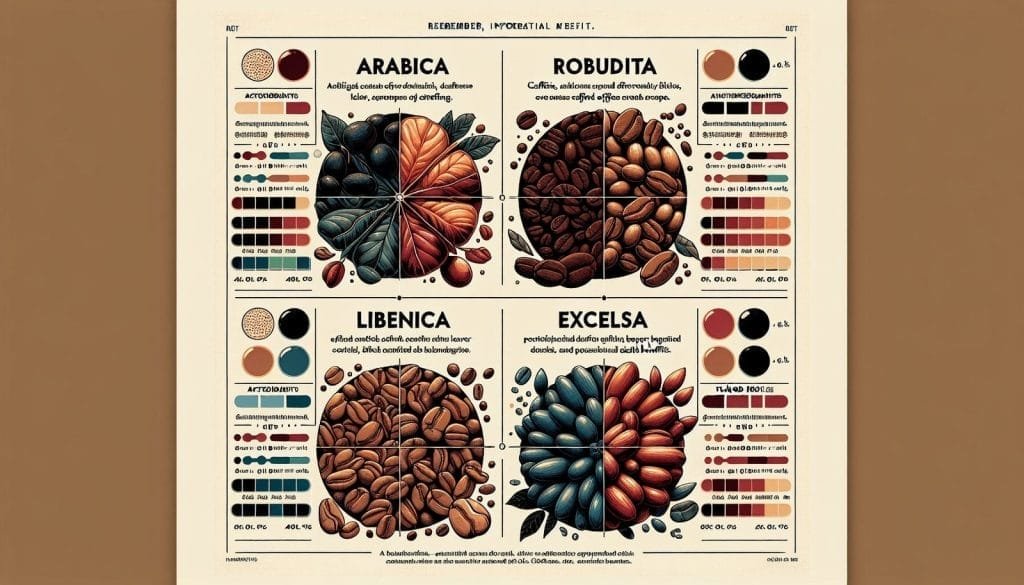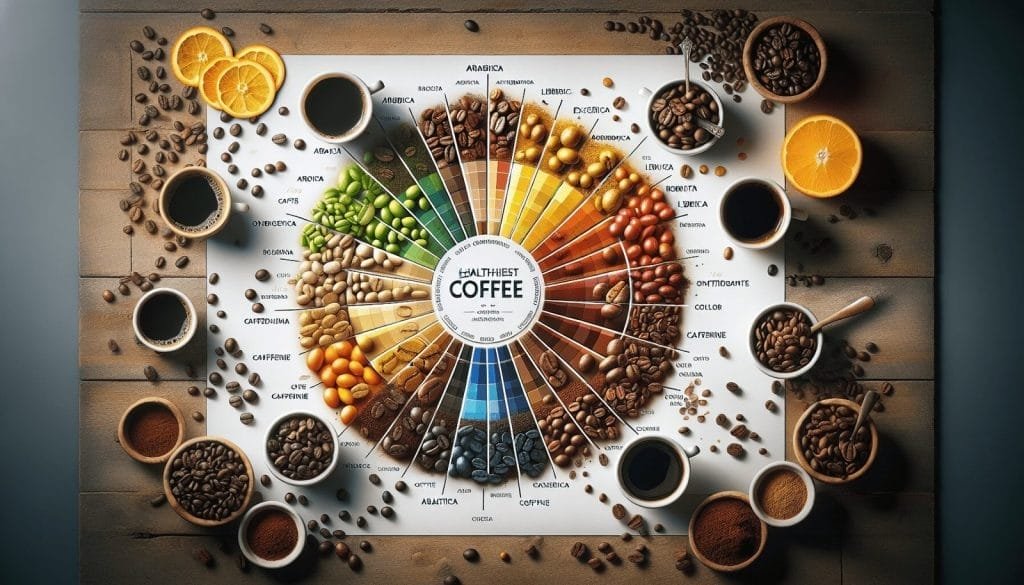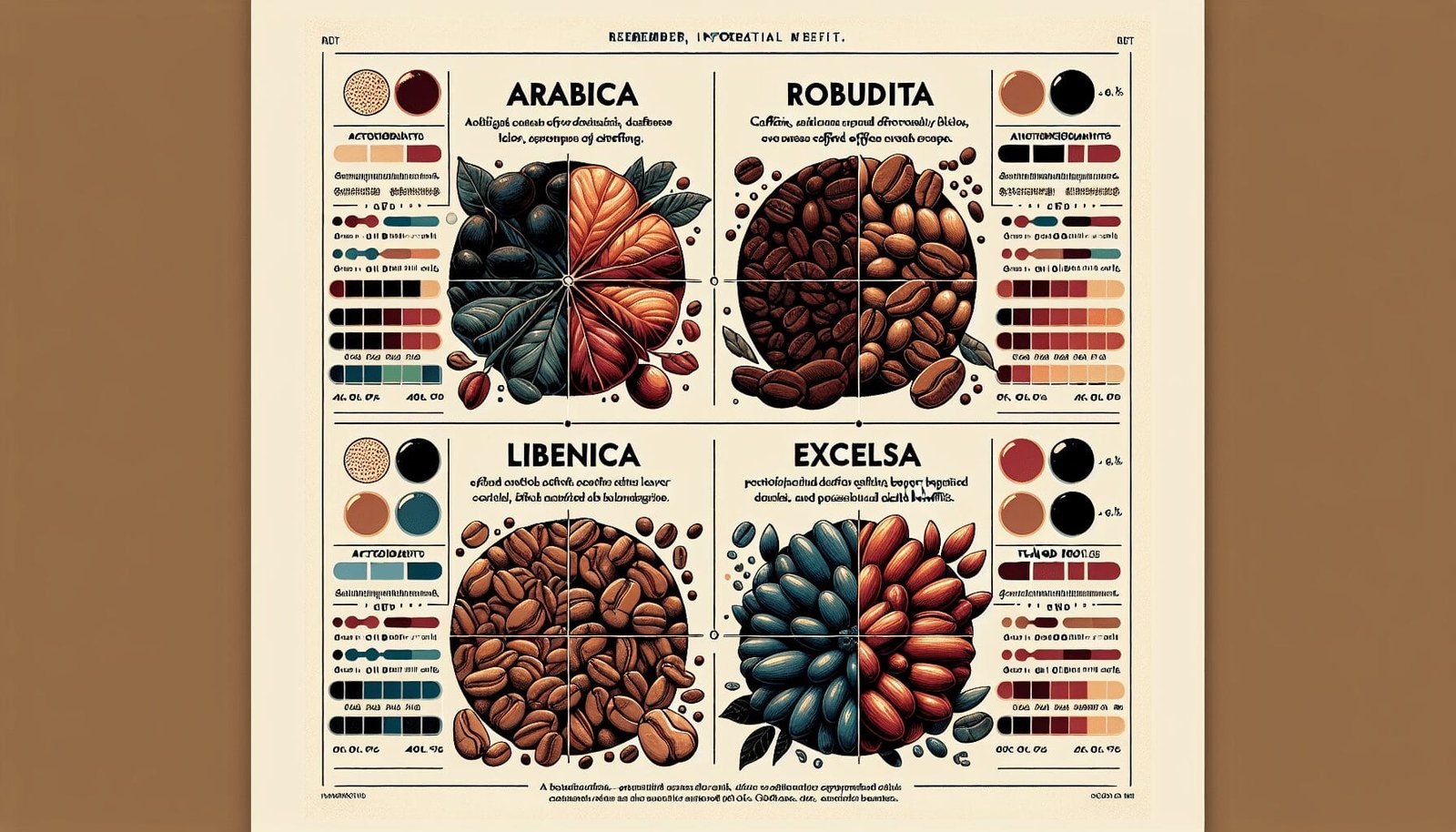Indulge your taste buds and nourish your body with the ultimate question: what type of coffee bean holds the coveted title of being the healthiest? As you embark on this sensory journey, we will explore the diverse world of coffee beans, unlocking the secrets and benefits hidden within each unique variety. From the delicate notes of Arabica to the bold flavors of Robusta, discover the key to a guilt-free and rejuvenating coffee experience. Prepare to savor and unravel the mysteries behind the healthiest coffee bean known to mankind.

Different Types of Coffee Beans
Arabica
Arabica is one of the most popular and widely consumed types of coffee beans in the world. Known for its mild and delicate flavor, Arabica beans are cultivated mainly in countries such as Brazil, Colombia, and Ethiopia. These beans are typically grown at higher altitudes, which contributes to their unique taste profile. Arabica beans have a lower caffeine content compared to other varieties, making them a preferred choice for those who are sensitive to caffeine.
Robusta
Robusta coffee beans are known for their strong and bold flavor. These beans are commonly used in espresso blends and instant coffee due to their higher caffeine content and lower acidity. Unlike Arabica beans, Robusta beans thrive in lower altitudes and are less susceptible to diseases and pests. While Robusta beans may not offer the same complexity of flavors as Arabica beans, they do provide a rich and intense taste, making them a popular choice among espresso enthusiasts.
Liberica
Liberica coffee beans are considered rare and are often sought after by coffee connoisseurs looking to try something unique. These beans have a distinct flavor profile, often described as having a woody and fruity taste with floral and smoky notes. Liberica beans are primarily grown in the Philippines and have a lower acidity compared to Arabica and Robusta beans. Although not as widely available as other varieties, Liberica beans offer a one-of-a-kind coffee experience for those looking to explore different flavor profiles.
Excelsa
Excelsa coffee beans are less common, but they provide an intriguing taste experience for coffee lovers. These beans originate from the same family as Liberica and are known for their unique flavor characteristics. Excelsa beans have a tart and fruity flavor with hints of dark chocolate and a slightly spicy finish. While Excelsa beans are often used as a component in coffee blends, they are also enjoyed on their own for their distinctive and complex taste.
Health Benefits of Coffee
Antioxidants
Coffee is known to be rich in antioxidants, which help protect the body against free radicals and oxidative stress. These antioxidants, such as chlorogenic acid and caffeine, can have a positive impact on overall health by reducing inflammation and preventing cell damage. Regular consumption of coffee, therefore, may contribute to a healthier and more resilient immune system.
Boosting Energy Levels
One of the most well-known benefits of coffee is its ability to boost energy levels. The caffeine present in coffee acts as a stimulant, helping to improve alertness and increase focus. By blocking adenosine, a neurotransmitter that promotes sleep, coffee can provide a natural energy boost and help you stay productive throughout the day.
Enhancing Brain Function
Coffee has been shown to enhance cognitive function and improve mental performance. The caffeine in coffee stimulates the central nervous system, increasing brain activity and concentration. Studies have also indicated that coffee may help reduce the risk of neurological disorders such as Alzheimer’s and Parkinson’s disease.
Reducing the Risk of Certain Diseases
Numerous studies have suggested that coffee consumption is associated with a reduced risk of various diseases. Some of these include type 2 diabetes, liver diseases such as cirrhosis and liver cancer, and certain types of cancer, including colorectal and endometrial cancer. Additionally, coffee has been found to have a protective effect against heart disease and stroke.
Caffeine Content in Coffee Beans
Arabica vs Robusta
When it comes to caffeine content, Robusta beans contain about twice as much caffeine as Arabica beans. This higher caffeine content in Robusta beans contributes to their stronger and more bitter taste. Arabica beans, on the other hand, have a lower caffeine content but are appreciated for their sweeter and more nuanced flavor profiles. Choosing between Arabica and Robusta beans often depends on personal preferences, as well as the desired caffeine intake.
Effects of Caffeine on Health
While caffeine can provide various health benefits, it is essential to consume it in moderation. Excessive caffeine intake can lead to increased heart rate, anxiety, and difficulty sleeping. It is recommended to limit daily caffeine intake to no more than 400 milligrams, which is approximately four cups of brewed coffee. Additionally, individuals who are sensitive to caffeine or have certain health conditions should be cautious and may want to consider opting for decaffeinated coffee.
Nutritional Profile of Coffee Beans
Calories
Coffee beans have a low calorie content, with approximately 2 calories per gram. This makes coffee a suitable beverage for those looking to manage their calorie intake. However, it is important to note that the calories can increase significantly when adding sweeteners, milk, or other flavorings to your coffee.
Fat
Coffee beans naturally contain very little fat, with less than 1 gram of fat per ounce. This makes coffee a low-fat beverage option. However, the addition of cream or other high-fat additives can increase the fat content significantly.
Protein
While coffee beans do contain a small amount of protein, it is generally not a significant source of this nutrient. Protein-rich foods should be consumed alongside coffee to meet daily protein requirements.
Carbohydrates
Coffee beans contain negligible amounts of carbohydrates, with less than 1 gram per ounce. This makes coffee a suitable option for those following low-carbohydrate or ketogenic diets.

Levels of Acidity in Coffee Beans
pH Scale
The acidity of a substance is measured on a pH scale, ranging from 0 to 14. A pH value below 7 indicates acidity, while a value above 7 indicates alkalinity. Coffee usually falls within the acidic range, with a pH value ranging from around 4.5 to 6. The acidity in coffee contributes to its characteristic flavors and can vary depending on the type of beans and the roasting process.
Acidity in Different Types of Beans
The level of acidity can vary among different types of coffee beans. Arabica beans tend to have a higher acidity compared to Robusta beans, giving them a bright and tangy flavor. Liberica beans, on the other hand, have a lower acidity level, providing a smoother and less acidic taste profile. The acidity in coffee can be altered through the roasting process, with darker roasts typically having lower acidity.
Chlorogenic Acid in Coffee
Health Benefits
Chlorogenic acid is a natural compound found in coffee beans that has been linked to various health benefits. It has antioxidant properties, which can help reduce inflammation and protect against chronic diseases. Chlorogenic acid may also contribute to improving insulin sensitivity, making it beneficial for individuals with type 2 diabetes. Additionally, this compound has shown potential in promoting weight loss by increasing fat metabolism and reducing the absorption of carbohydrates in the digestive system.
Potential Side Effects
While chlorogenic acid offers numerous health benefits, excessive consumption of coffee or concentrated chlorogenic acid supplements may lead to digestive issues such as diarrhea and stomach discomfort. It is important to consume coffee in moderation and be mindful of any potential adverse effects.
The Role of Roasting
Light Roast
Light roasted coffee beans are generally characterized by their light brown color and fruity and acidic flavor profiles. The shorter roasting time allows the beans to retain more of their original characteristics, resulting in a brighter and more delicate taste. Light roasts typically have higher caffeine content compared to darker roasts and offer a more vibrant coffee experience.
Medium Roast
Medium roasted coffee beans are a balance between the brightness of light roasts and the richness of dark roasts. They have a medium brown color and a well-rounded flavor profile with slightly reduced acidity. Medium roasting enhances the sweetness and body of the beans, creating a coffee that is smooth yet flavorful.
Dark Roast
Dark roasted coffee beans are characterized by their dark brown color and oily surface. The longer roasting time reduces the acidity and creates a bold and robust flavor profile. Dark roasts tend to have lower caffeine content compared to lighter roasts due to the extended roasting process. These beans are often used in espresso blends and provide a rich and intense coffee experience.
Organic and Fair Trade Coffee Beans
Benefits of Organic Coffee
Organic coffee beans are grown without the use of synthetic fertilizers, pesticides, and herbicides, making them a healthier and more environmentally friendly choice. By opting for organic coffee, you support sustainable farming practices that prioritize soil health, biodiversity, and the well-being of farmworkers. Organic coffee is also free from genetically modified organisms (GMOs) and often has a more nuanced and flavorful taste profile.
Importance of Fair Trade
Fair trade coffee ensures that farmers receive fair prices for their products and are supported by equitable trading relationships. Fair trade certification guarantees that coffee is produced under socially and environmentally responsible conditions, promoting sustainability and empowering coffee-growing communities. By choosing fair trade coffee, you contribute to a more just and ethical coffee industry.
Decaffeinated Coffee Beans
Methods of Decaffeination
Decaffeinated coffee beans are processed to remove most of the caffeine content while retaining the flavors and aroma of the beans. There are several methods of decaffeination, including the Swiss Water Process, solvent-based processes, and carbon dioxide extraction. Each method has its own advantages and drawbacks, but all aim to provide consumers with a coffee option that has reduced caffeine content.
Health Considerations
Decaffeinated coffee can be a suitable choice for individuals who are sensitive to caffeine or looking to minimize their caffeine intake. However, it is important to note that decaffeinated coffee may still contain a small amount of caffeine, typically ranging from 1 to 5 milligrams per cup. Additionally, some decaffeination methods may involve the use of chemicals, so it is advisable to choose decaf coffee that has been processed using natural methods whenever possible.
Choosing the Healthiest Coffee Bean
Considerations
When choosing the healthiest coffee bean, it is important to consider your individual preferences, dietary needs, and tolerance to caffeine. If you prefer a milder and less acidic taste, Arabica beans may be a suitable choice. For those who enjoy a bolder and stronger flavor, Robusta beans can provide a more robust coffee experience. If you’re looking for a unique coffee experience, exploring Liberica or Excelsa beans can offer a different flavor profile.
Personal Preference
Ultimately, the healthiest coffee bean for you is the one that aligns with your taste preferences, dietary requirements, and overall well-being. It is important to listen to your body and choose coffee beans that bring you joy and satisfaction. Remember to consume coffee in moderation and consider adding minimal or no sweeteners to maintain the health benefits and nutritional value of your cup of coffee.




